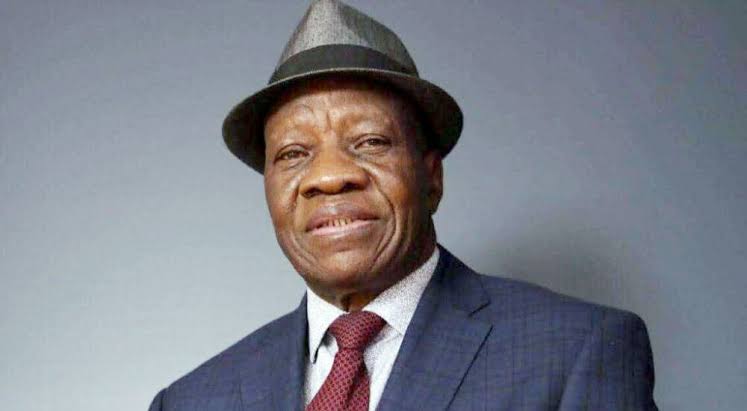News
BREAKING: Former Minister of Education, Prof Osuji is dead

Professor Fabian Osuji, a former Minister of Education is dead
He died on Wednesday morning, according to a family member who confirmed the development.
He had returned from a vacation in the United States on Saturday and had been treated for undisclosed medical issues.
Fabian Ngozichukwu Chinedum Osuji was born on January 20, 1942, and attended Holy Ghost College in Owerri, Government College in Umuahia, the University of Nigeria in Nsukka, Enugu State, and the University of Ibadan, Oyo State.
He conducted his post-doctoral research at the Imperial College of Science and Technology in London.
He became a Lecturer, Senior Lecturer and Associate Professor in the Department of Zoology, University of Ibadan in 1973, a post he held till 1981.
He was also a Visiting Scientific Fellow at the International Atomic Energy Agency and the Food and Agriculture Organization.
He became a Dean of the College of Science, Dean of the College of Postgraduate Studies, Deputy Vice-Chancellor and member of the Governing Council of Imo State University.
He was appointed Professor of Applied Biology, at St. John’s University, New York (CUNY) USA (1997-1999).
He was also a Visiting Professor at several universities in Nigeria and worldwide.
Known as a scholars’ scholar, he published 35 papers and books to his credit.
He celebrated his 80th birthday in 2022 when family and friends gathered to extol the virtue of a man highly regarded as a sound educationist.
The former educationist died aged 81.
News
Drug war: First Lady Senator Tinubu, UNODC, Marwa charge states on community-based interventions(Photos)

. ‘62,595 suspects arrested, 11,628 convicted and 10.3million kilograms illicit drugs seized in 51 months’
State governments have been charged to embrace and entrench community-based interventions that will curb the impact of the scourge of substance abuse and illicit drug trafficking at the grassroots in line with the National Drug Control Master Plan (NDCMP).
The charge was the highpoint of remarks by the First Lady, Senator Oluremi Tinubu; Chairman/Chief Executive Officer of the National Drug Law Enforcement Agency, (NDLEA) Brig Gen Mohamed Buba Marwa; Country Representative of the United Nations Office on Drugs and Crime (UNODC) Cheikh Ousmane Toure as well as ECOWAS representative, Dr. Daniel Amankwaah at a training workshop organized by NDLEA for the Nigeria Governors Spouses’ Forum in Abuja on Tuesday 6th May 2025.
In her keynote address to the gathering, Senator Tinubu who was represented by wife of the Deputy Senate President, Hajiya Laila Jibrin Barau commended the NDLEA, and NGSF for the initiative aimed at advancing drug control efforts to the grassroots across the country. She specifically commended Marwa and his team “for courageously confronting the fight against illicit drug abuse and trafficking in the country.”
According to her, “This training cannot be coming at any better time than now when statistics and daily life experiences are revealing that drugs have infiltrated every nook and cranny of our communities. As a nation, we are confronted with a growing crisis, one that affects the very core of our society, the health, safety, and future of our children.
“The rising tide of drug and substance abuse amongst adolescents is a challenge that we must no longer ignore or tackle in isolation. It requires concerted efforts, community-driven response, one that integrates enforcement, education, family support, and sustained intervention. Our presence at this training testifies to the collective resolve we display in ensuring that we strengthen, secure, and safeguard families and communities.
“Today’s training will ensure that we are adequately armed with the right knowledge, tools, skills, and competencies necessary to effectively tackle this complex issue. It is my hope that this capacity-building workshop, through honest discussions and sharing of best practices, will provide valuable insights into evidence-based strategies for prevention, early intervention, and holistic treatment approaches, especially targeting marginalized and vulnerable communities.
“I urge us to utilize the knowledge gathered at this training to develop viable solutions while collaborating with relevant stakeholders, especially the National Drug Law Enforcement Agency, other law enforcement agencies, MDAs, civil society organizations, healthcare providers, educators, and community leaders.
“Let us always bear in mind that as state First Ladies, you owe our people the duty to lead by example, to bear their burden, and share in their pain as we jointly confront drug abuse in our society. I urge us to continue to provide the right direction through prevention initiatives, advocating for those whose voices have been silenced by addiction, providing community interventions to support recovery and reintegrate people into communities after treatment.
“Let us approach the formidable task ahead with humility, doggedness, and commitment to enable us to build communities where our children are protected from harm and empowered to thrive. Together, we can change the narrative, restore dignity to our communities, and ensure a healthier, safer future for all Nigerians.”
In his welcome address, Marwa noted that the drug scourge obstructs progress and dims prospects in an already beleaguered world. “Regrettably, Nigeria is not immune to this scourge, which steadily infiltrates every stratum of our society. Statistics, academic research, and lived experiences alike reveal a grim reality about illicit drug use and consequences in the country. The magnitude and impact of the drug crisis render the attainment of our national aspiration—improving the health and security of all who dwell within our borders, as enshrined in the National Drug Control Master Plan 2021–2025—a daunting yet inevitable task for any government and people worthy of the name.”
He said it is imperative for all stakeholders at the workshop to adopt urgent, holistic, and inclusive strategies to dismantle the drug menace. According to him, “Over the past four years, the NDLEA has pursued this mission with renewed and unwavering zeal, ensuring that Nigeria’s hard-won global and regional drug control successes are not merely preserved but expanded.
“Permit me to inform this distinguished gathering that over the four years, the NDLEA has deployed substantial resources towards a comprehensive assault on the drug problem, yielding significant outcomes. Under the drug supply reduction mandate—encompassing drug seizures, arrests, prosecutions, and convictions—we recorded the arrest of 62,595 drug suspects (Including 68 drug barons), the seizure of 10,317,137.55 kilograms of assorted drugs, and secured the conviction of 11,628 offenders. Furthermore, 1,330.56553 hectares of cannabis farms were identified and destroyed.
“To ensure a balanced approach in accordance with international best practices, equal emphasis has been placed on drug demand reduction. Between January 2021 and March 2025, a total of 24,375 drug users received counselling and treatment at NDLEA facilities, primarily through brief interventions. Concurrently, 10,501 drug sensitisation programmes were conducted nationwide under the auspices of the War Against Drug Abuse (WADA) social advocacy campaign, reaching diverse target groups within communities. In parallel, a remarkable 3, 843, 789 participants were mobilized to partake in these enlightenment initiatives undertaken across the nation.”
He charged the stakeholders not surrender to despair over the menace of drug abuse. “As patriots and vanguards of our nation’s well-being, it falls on us to strengthen our resolve, to move with deliberate speed towards practical and lasting resolutions that will, God willing, break the vicious cycle of drug abuse. This capacity building event represents a stride, small though it may seem, in the proper direction.
“Since it is at the community level that the burden of the drug menace is most acutely felt, it is vital that stakeholders, including all of us gathered here today, address the different dimensions of the problem from a community-centred perspective. This gathering must strive for common ground, developing indigenous and pragmatic solutions that go beyond mere statistics and harrowing headlines, addressing instead the real and harrowing human toll of drug abuse.”
He expressed confidence that the training will strengthen capacities, harness community resources, and unlock the potential needed to formulate and implement evidence-based interventions that will salvage and rejuvenate every segment of beleaguered communities. “Let us, as frontliners, ever remember: the cost of inaction is infinitely higher than the cost of collective action. Your Excellencies, your roles as mothers, changemakers, and drivers of the State Drug Control Committees (SDCC) place upon you a sacred trust—a responsibility not to be borne lightly. Through your ingenuity, your states may yet emerge as shining examples, immortalised in gold as bastions of hope that defied the tides of darkness.
“The SDCCs remain a potent platform for fostering multisectoral collaboration in the crucial task of drug demand reduction at the state level. I must fervently implore you to ensure the establishment, strengthening, and revitalisation of these Committees across your respective states. Let us always remember that the value of these training events lies not in the richness of their content alone, but in the continued motion and effectiveness of the SDCCs—moving resolutely towards our collective aspiration of a drug-free, resilient Nigeria”, he added.
Also speaking at the workshop, UNODC Country Rep Cheikh Ousmane Toure stated that “If the root of this crisis lies in our neighborhoods, schools, and homes, then the solution must too. The National Drug Control Master Plan and the WADA initiative remind us of that national framework alone cannot heal fractured communities. Lasting change begins when states and local governments own this fight.”
He reminded the first ladies that their influence transcends politics, adding that “you are the custodian of trust in your states. When you speak, community listens. When you act, local governments follow. Today, I urge us to channel this unique power into three pillars of action.
Number one, state-led resource mobilization. Every state must prioritize dedicated budget for prevention and treatment. This means establishing a state-specific drug control task force to align with NDLEA’s national efforts, allocating local government funds to build community drop-in centres, safe space for counseling, and care within walking distance of those in need.”
The UNODC chief stated further that states must adopt evidence-based programmes to their cultural contexts, and decentralize treatment access. The head of ECOWAS Drug Prevention and Control Division, Dr. Daniel Amankwaah spoke in same light in his goodwill message, urging state governments to invest in prevention and treatment efforts at the state and community-levels.
Experts who served as resource persons during the technical session of the workshop include: Dr. Martins Agwogie, Prof. Akintunde Oyedokun, Dr. Akanidomo Ibanga, Dr. Kunle Adeshina, Dr. Abubakar Salami, Dr. Kunle Adeshina and Dr. Ngozi Madubuike.
News
Court bans Nnamdi Kanu’s in-law from 3 proceedings over live streaming

Robert Imoh by Robert Imoh May 6, 2025
Court bans Nnamdi Kanu’s in-law from 3 proceedings over live streaming
The Federal High Court in Abuja, on Tuesday, banished Mrs Favour Kanu, wife of Prince Fineboy Kanu, the younger brother to Nnamdi Kanu for streaming the proceedings of the court life on her Facebook page.
Kanu, the leader of the proscribed Indigenous People of Biafra (IPOB), is being prosecuted by the Federal Government for alleged terrorism charge.
Justice James Omotosho, who gave the order, after Mrs Favour admitted engaging in the act and apologised to the court, held that Mrs Favour would have been charged for contempt of court.
Although Kanu’s lawyer, Chief Kanu Agabi, SAN, also apologised on her behalf, Justice Omotosho insisted that Mrs Favour would be barred from three proceedings.
The judge expressed surprise that despite that Mrs Favour’s phone was confiscated on the last adjourned date when she was caught recording him, she still went ahead to post the video online.
” I want to hear from her. Were you not the one that I took your phone?
“I did not give order to forfeit that phone. I don’t know if she might be a wife to my brother (Nnamdi Kanu,” the judge said, but Prince told the judge that she is his wife.
The judge, who cautioned against any act that could cause delay in the trial, assured all parties in the case that justice would be served.
News
Defence minister confirms over 8,000 terrorists, bandits wasted under Tinubu’s admin

The Minister of State for Defence, Bello Matawalle, has announced that over 8,000 terrorists and bandits were neutralised across Nigeria in 2024 under the leadership of President Bola Ahmed Tinubu.
Matawalle attributed the improved security outcomes to renewed strategic military operations and the focused leadership brought by the Tinubu administration.
In addition to the killings, security forces reportedly arrested more than 11,600 suspected criminals and recovered over 10,000 illegal firearms nationwide.
These figures were contained in a statement released Monday by Patience Ituke, on behalf of the Ministry of Defence’s Director of Information and Public Relations.
Commending the President’s reform agenda, Matawalle expressed confidence that Tinubu’s efforts are laying the groundwork for national progress and may position him favorably for re-election in 2027.
“Bello Matawalle lauded President Bola Ahmed Tinubu for his transformative reforms, asserting that these initiatives will pave the way for a brighter future for Nigeria and potentially secure Tinubu’s re-election in 2027,” the statement noted.
The minister outlined several major accomplishments under the current administration, particularly in the defence sector.
The neutralisation of over 8,000 terrorists and bandits, arrest of 11,600 suspected criminals and recovery of more than 10,000 illegal weapons.
He also highlighted the establishment of the Multi-Agency Anti-Kidnap Fusion Cell as a significant step in strengthening coordination among security agencies to combat kidnapping.
Matawalle further cited the creation of the Ministry of Livestock Development as a strategic move to boost agricultural productivity and reduce grain prices, particularly in northern Nigeria.
“The Ministry of Livestock Development is harnessing the agricultural potential of the region, boosting the economy, and improving livelihoods,” he said.
On infrastructure, the minister mentioned ongoing road construction projects and upgrades to the nation’s transportation networks. He believes these efforts will drive economic growth, especially in underserved communities.
While confident in the President’s record so far, Matawalle noted that Tinubu’s chances for a second term would ultimately depend on the sustained momentum of these initiatives.
-

 Entertainment24 hours ago
Entertainment24 hours agoHow I narrowly escaped death in U.S hotel room – Seun Kuti
-

 Opinion1 hour ago
Opinion1 hour agoRIVERS, WIKE, FUBARA, AND THE WAY FORWARD
-

 News21 hours ago
News21 hours agoReps Minority Caucus condemns unlawful detention of VDM, demands his immediate release
-

 News11 hours ago
News11 hours agoMinistry denies awarding N13bn contracts without due process
-

 News11 hours ago
News11 hours agoFULL STEPS: How to check 2025 JAMB results
-

 News23 hours ago
News23 hours agoWATCH Your family Lawyer’s last episode on how to end marriage
-

 News5 hours ago
News5 hours agoVDM may be released on Tuesday
-

 News11 hours ago
News11 hours agoCourt halts Abuja multi-million naira market project










